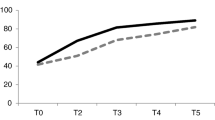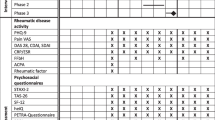Abstract
Individualized treatment of rheumatoid arthritis (RA) based on genetic/serologic factors is increasingly accepted. Moreover, patients are more actively involved in the management of their disease. However, personality has received little attention with respect to perception of the need and adherence to treatment. Our objective was to evaluate whether patient personality was associated with the acceptance or rejection of more aggressive early treatment. We performed a cross-sectional study in two hospitals with early arthritis clinics where sociodemographic, clinical, and therapeutic variables are systematically recorded. Patients completed Eysenck Personality Questionnaire, Multidimensional Health Locus of Control, Pain-Related Self-Statement Scale and Pain-Related Control Scale. Aggressive treatment was considered if patients received more than two DMARDs or biological agents during the first year of follow-up. Multivariate logistic regression analysis was performed to determine predictors of aggressive treatment. One hundred seventy-six RA patients were included (80 % women, disease begin median age 55 years). Treatment was considered aggressive in 57.9 % of the sample. Scores were high in extraversion in 50.8 % of patients, neuroticism in 29.5 % and psychoticism in 14.7 %. Neuroticism was the only factor associated with aggressive treatment, which was less probable (p = 0.04, OR = 0.40). Neuroticism also decreased the possibility of receiving a combination of biologics and DMARDs (p = 0.04, OR = 0.28). Patients with high scores on neuroticism are more worried, obsessive and hypochondriac, leading them to reject more aggressive therapy. It is important to educate about their disease so that they will accept more aggressive approaches in clear cases of poor outcome.
Similar content being viewed by others
References
Spector TD (1990) Rheumatoid arthritis. Rheum Dis Clin N Am 16:513–537
Carmona L, Villaverde V, Hernandez-Garcia C, Ballina J, Gabriel R, Laffon A (2002) The prevalence of rheumatoid arthritis in the general population of Spain. Rheumatology (Oxford) 41:88–95
Pincus T, Callahan LF, Sale WG, Brooks AL, Payne LE, Vaughn WK (1984) Severe Functional declines, work disability, and increased mortality in seventy-five rheumatoid arthritis patients studied over nine years. Arthritis Rheum 27:864–872
Engel GL (1977) The need for a new medical model: a challenge for biomedicine. Science 196:129–136
Welsing PM, Fransen J, van Riel PL (2005) Is the disease course of rheumatoid arthritis becoming milder? Time trends since 1985 in an inception cohort of early rheumatoid arthritis. Arthritis Rheum 52:2616–2624
Smolen JS, Landewé R, Breedveld FC, Dougados M, Emery P, Gaujoux-Viala C et al (2010) EULAR recommendations for the management of rheumatoid arthritis with synthetic and biological disease-modifying antirheumatic drugs. Ann Rheum Dis 69:964–975
Sanmartí R, García-Rodríguez S, Álvaro-Gracia JM, Andreu JL, Balsa A, Cáliz R et al (2015) 2014 update of the Consensus Statement of the Spanish Society of Rheumatology on the use of biological therapies in rheumatoid arthritis. Rheumatol Clin 11:279–294
Pincus T, Yazici Y, Sokka T, Aletaha D, Smolen JS (2003) Methotrexate as the “anchor drug” for the treatment of early rheumatoid arthritis. Clin Exp Rheumatol 21:S179–S185
Singh JA, Furst DE, Bharat A et al (2012) 2012 update of the 2008 American College of Rheumatology recommendations for the use of disease-modifying antirheumatic drugs and biologic agents in the treatment of rheumatoid arthritis. Arthritis Care Res (Hoboken) 64(5):625–639
Boers M (2003) Understanding the window of opportunity concept in early rheumatoid arthritis. Arthritis Rheum 48:1771–1774
Raza K, Buckley CE, Salmon M, Buckley CD (2006) Treating very early rheumatoid arthritis. Best Pract Res Clin Rheumatol 20:849–863
Saunders SA, Capell HA, Stirling A, Vallance R, Kincaid W, McMahon AD et al (2008) Triple therapy in early active rheumatoid arthritis: a randomized, single-blind, controlled trial comparing step-up and parallel treatment strategies. Arthritis Rheum 58:1310–1317
Scott DL, Kingsley GH (2006) Tumor necrosis factor inhibitors for rheumatoid arthritis. N Engl J Med 355:704–712
Larsen RJ, Buss DM (2002) Personality psychology: domains of knowledge about human nature. McGraw Hill, New York
Shiner RL, DeYoung CG (2011) The structure of temperament and personality traits: a developmental perspective. In: Zelazo PD (ed) The Oxford handbook of developmental psychology. Oxford University Press, New York
Eysenck HJ, Eysenck SBG (1976) Psychoticism as a dimension of personality. Hodder & Stoughton, London
McCrae RR, Costa PT Jr (1997) Personality trait structure as a human universal. Am Psychol 52:509–516
Braun IM, Liang MH, Orav EJ, Ahern DK, Barsky AJ (2008) A personality characteristic, somatic absorption and the perception of somatic symptoms in rheumatoid arthritis patients. J Rheumatol 35:782–789
Keefe FJ, Dashikar-Zuck S, Caldwell DS (1998) Coping strategies for the patients with osteoarthritis. In: Doherty M, Brandt K, Lohmander S (eds) Textbook on osteoarthritis. Oxford University Press, New York
Smarr KL, Parker JC, Wright GE, Stucky-Ropp RC, Buckelew SP, Hoffman RW et al (1997) The importance of enhancing self-efficacy in rheumatoid arthritis. Arthritis Care Res 10:18–26
Garrido M, Rodríguez L (1998) Personalidad, procesos cognitivos y psicoterapia: un enfoque constructivista. In: García J, Garrido M, Rodríguez L (eds) Personalidad, procesos cognitivos y psicoterapia. Editorial Fundamentos, Madrid
Sandín B, Valiente RM, Chorot P, Olmedo M, Santed MA (2002) Versión española del cuestionario EPQR-Abreviado (EPQR-A) (I): análisis exploratorio de la estructura factorial. Revista de Psicopatología y Psicología Clínica 7:195–205
Sandín B, Valiente RM, Olmedo M, Chorot P, Santed MA (2002) Versión española del cuestionario EPQR-Abreviado (EPQR-A) (II): replicación factorial, fiabilidad y validez. Revista de Psicopatología y Psicología Clínica 7:207–216
Toomey TC, Lundeen TF, Mann JD, Abashian S (1988) The pain Locus of control scale: a comparison of chronic pain patients and the normals. In: Annual Joint Meeting of American/Canadian Pain Societies, 10–13 November, 1988, Toronto, Canada
Pastor MA, López S, Rodríguez J, Sánchez S, Salas E, Pascual E (2009) Expectativas de control sobre la experiencia de dolor: adaptación y análisis preliminar de la escala multidimensional de locus de control de salud. Revista de Psicología de la Salud 2(1–2):91–111
Flor H, Behle DJ, Birbaumer N (1993) Assessment of pain-related cognitions in chronic pain patients. Behav Res Ther 31:63–73
Camacho L, Anarte MT (2003) Creencias, afrontamiento y estado de ánimo deprimido en pacientes con dolor crónico. Psicothema 15:464–470
Sokka T, Kautiainen H, Toloza S, Makinen H, Verstappen SM, Lund Hetland M et al (2007) QUEST-RA: quantitative clinical assessment of patients with rheumatoid arthritis seen in standard rheumatology care in 15 countries. Ann Rheum Dis 66:1491–1496
Ramírez C, Esteve R, López A (2001) Neuroticismo, afrontamiento y dolor crónico. Anales de Psicología 17:129–137
Persson LO, Sahlberg D (2002) The influence of negative illness cognitions and neuroticism on subjective symptoms and mood in rheumatoid arthritis. Ann Rheum Dis 61:1000–1006
Bolger N (1990) Coping as a personality process: a prospective study. J Pers Soc Psychol 59:525–537
Costa PT, McCrae RR (1990) Personality: another “hidden factor” in stress research. Psychol Inq 1:22–24
Endler NS, DA Parker J (1990) Multidimensional assessment of coping: a critical evaluation. J Pers Soc Psychol 58:844–854
Epstein S, Meier P (1989) Constructive thinking: a broad coping variable with specific components. J Pers Soc Psychol 57:332–350
Afshar H, Roohafza HR, Keshteli AH, Mazaheri M, Feizi A, Adibi P (2015) The association of personality traits and coping styles according to stress level. J Res Med Sci 20:353–358
Affleck G, Tennen H, Urrows S, Higgins P (1992) Neuroticism and the pain-mood relation in rheumatoid arthritis: insights from a prospective daily study. J Consult Clin Psychol 60:119–126
Olchowska-Kotala A (2013) Individual differences in cancer patients’ willingness to use complementary and alternative medicine. Adv Clin Exp Med 22:855–860
Evers AW, Kraaimaat FW, Geenen R, Jacobs JW, Bijlsma JW (2002) Long term predictors of anxiety and depressed mood in early rheumatoid arthritis: a 3 and 5 year follow up. J Rheumatol 29:2327–2336
Jerant A, Chapman B, Duberstein P, Robbins J, Franks P (2011) Personality and medication non-adherence among older adults enrolled in a six-year trial. Br J Health Psychol 16:151–169
Edwards RR, Giles J, Bingham CO, Campbell C, Haythornthwaite JA, Bathon J (2010) Moderators of the negative effects of catastrophizing in arthritis. Pain Med 11:591–599
Abasolo L, Leon L, Rodriguez-Rodriguez L, Tobias A, Rosales Z, Leal J et al (2015) Safety of disease-modifying antirheumatic drugs and biologic agents for rheumatoid arthritis patients in real-life conditions. Semin Arthritis Rheum 44:506–513
Acknowledgments
This study was supported by the Instituto de Salud Carlos III (ISCIII), Ministry of Health, Spain. It was also funded in part by Fondo Europeo de Desarrollo Regional (FEDER) (Miguel Servet research contract CP11/00189 to Lydia Abásolo and CP12/03129 to Luis Rodriguez-Rodriguez; Fondo de Investigaciones Sanitarias grants PI11/00551 and PI14/00442; and Red de Investigación en Inflamación y Enfermedades Reumáticas Grants RD12/0009/0011 and RD12/0009/0017).
Author information
Authors and Affiliations
Corresponding author
Ethics declarations
Conflict of interest
All authors declare that they have no conflict of interest related to the manuscript.
Ethical approval
All procedures performed in studies involving human participants were in accordance with the ethical standards of the institutional and/or national research committee and with the 1964 Helsinki declaration and its later amendments or comparable ethical standards.
Additional information
Isidoro Gonzalez-Alvaro and Lydia Abasolo shared senior authorship.
Rights and permissions
About this article
Cite this article
Leon, L., Redondo, M., Garcia-Vadillo, A. et al. Influence of patient personality in the treatment of rheumatoid arthritis. Rheumatol Int 36, 1549–1555 (2016). https://doi.org/10.1007/s00296-016-3561-9
Received:
Accepted:
Published:
Issue Date:
DOI: https://doi.org/10.1007/s00296-016-3561-9




